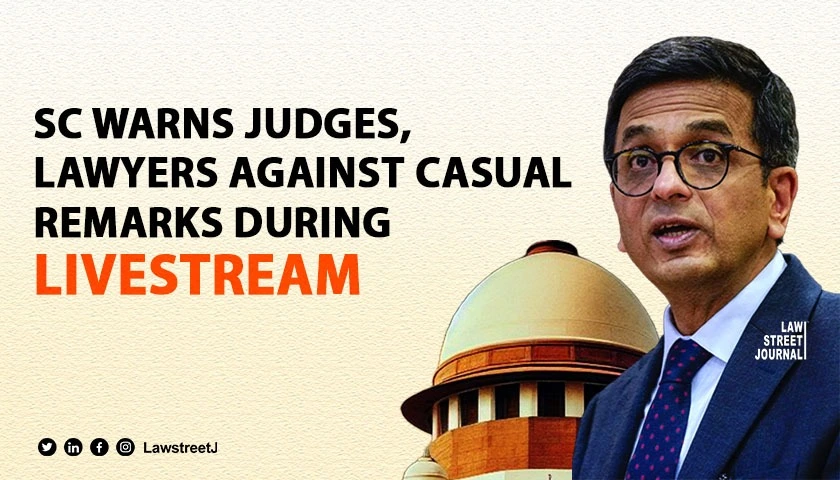NEW DELHI: The Supreme Court on Wednesday advised judges, lawyers and litigants during the live streaming of the court proceedings due to its wider impact in the age of social media.
The top court also said one cannot call any part of the country as Pakistan as it is fundamentally against the territorial integrity of the nation.
A five-judge Constitution bench led by Chief Justice of India D Y Chandrachud closed the suo motu proceedings against a Karnataka High Court's judge, taking note of an apology tendered by Justice V Srishananda for his observations, calling a part of Bengaluru as Pakistan and other remarks against a woman lawyer during two separate proceedings.
However, the court asked lawyers, judges, litigants not to indulge in the casual conduct having a wider impact, as they should understand that livestreaming of the proceedings has significant reach to the audiences well beyond the court.
"As judges, the dispositions based on our life experiences are there, at the same time, a judge has to be aware of his own pre-dispositions. It is only on basis of such awareness we can be faithful in duty to deliver objectiveness and fairness. Casual observations can indicate a degree of bias particularly when they are directed against a gender or community," the bench said.
The bench also felt such controversies should not trigger a demand to stop livestreaming of court proceedings.
"Social media can't be controlled and the answer to sunlight is more sunlight. Not to suppress what happened because this is an important reminder to everyone and the answer is not to close doors and shut everything down but to say look...," the bench said, while closing the proceedings against the Hgh Court judge.
Justice Srishananda had purportedly referred to a Muslim dominated locality in Bengaluru as "Pakistan". The judge was also seen to have made gender insensitive comments against a woman lawyer in a separate matter. After several handles on X objected to his remarks in their posts, forcing the court to initiate suo motu proceedings in the matter on September 20 and seeking a report from the Registrar General of the High Court.
Perusing the Registrar General's September 23 report on observations made by the judge, the bench said the text of the report amply indicated that the remarks made were "unrelated and should have best been eschewed'.
"Bearing in mind the apology tendered by the judge in open court proceedings, we consider it in the interest of justice and dignity of institution not to continue the proceedings further," the bench, also comprising Justices Sanjiv Khanna, B R Gavai, Surya Kant and Hrishikesh Roy, said.
The court, however, pointed out the prevalence and reach of social media has included wide reporting of the proceedings.
"Most HCs have adopted livestreaming or videoconferencing. The necessity in Covid 19, livestreaming and video conferencing has emerged for providing access to justice. The lawyers, judges, members of the court should understand that livestreaming has significant reach to the audiences, which places responsibility on them," the bench said.
Attorney General R Venkatramani submitted that he has seen the clippings of the High Court's proceedings circulated on social media.
"I was wondering if it can be taken up in chambers instead of the judicial side. I have spoken to members of the Bar in Karnataka, if a larger issue is made out then it may have other ramifications," he said.
Solicitor General Tushar Mehta submitted since the judge has now apologised, the matter may not be stretched. He also said social media cannot be controlled.
On this, the bench said, "You cannot call any part of this country as Pakistan. It is fundamentally against the territorial integrity of the nation."
The court also noted the Registrar General's report concerned with two proceedings before the judge, which took place on June 6, 2024 and then another on August 28, 2024.
After the suo motu action by this court, the bench noted on September 20, Justice Srishananda, during couse of post lunch session, proceeded to read out an address in presence of members of the Bar and members of Bengaluru Advocates Association.
The report indicated that the judge has indicated that certain observations by him were quoted out of context, were unintentional, not meant to hurt sentiment of any segment of a society and that an apology is tendered if any section of the society is affected by such observations, the court said.

















